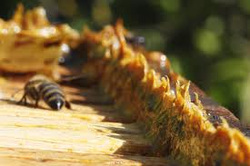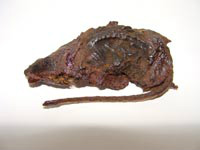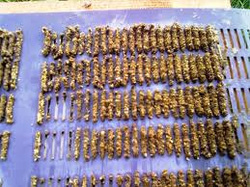
Propolis is a mixture of resins from trees and other plants which bees collect, mix with wax and then use to "caulk" the hive itself as well as many items in the hive.

The antibacterial nature of propolis helps the bees to keep the hive hygenic. Thus, rather than something sitting there rotting, the bees will coat the surface or the whole item with propolis.
For example, bees use propolis to "mummify" intruders that are too big to move. This mummification process essentially covers the critter in propolis, and the dead creature dries out. This protects the colony from diseases and putrification of this rotting creature.

Personally, I love the smell of propolis. When I was a kid beekeeper (yes, a long time ago), I used propolis to repair my archery arrow fletchings (that's the feathers), since Elmer's glue just didn't do it well enough, and this was before "super glue". The only problem I had was that propolis, when cold, gets very brittle very fast.
Other people I know will chew propolis, like gum, to provide some relief from mouth sores. Propolis has a lot of antimicrobial properties. Be sure to brush your teeth later though, as this will stick to your teeth! Or, you can make a tincture or lip balm and so on. Some recipies at this link or this one. In short, you have to extract the propolis by dissolving it in alcohol (e.g. Everclear), straining out the sludge, and then using the result in tinctures, balms and salves.
Now you know a lot about propolis! There is always more to learn around the hive.
See you there soon!
tim
 RSS Feed
RSS Feed